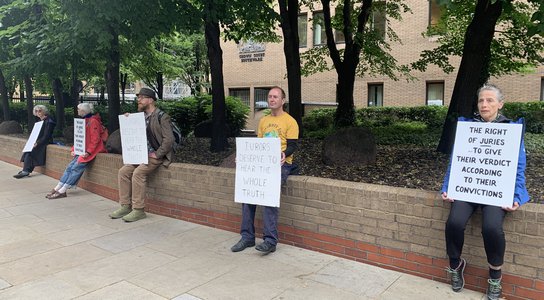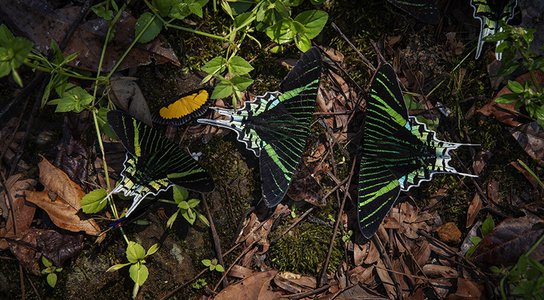Since 2015, a controversial landfill in the department of Santander in Colombia has spelled devastation for nearby communities and nature, with those who have spoken up against it receiving death threats from paramilitary groups. French corporate giant Veolia acquired the site in 2019 and claims to have cleared it up – but evidence from local groups suggests contamination continues, and environmentalists demand the site’s closure.
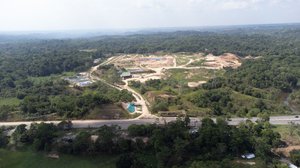
The Veolia-owned landfill site with the village of Patio Bonito situated just next to it, near Barrancabermeja, Colombia
The community of Patio Bonito was established 50 years ago in the San Silvestre wetlands, a verdant patchwork of swamps, lagoons and tropical forest cloaking a broad valley beneath the Andean peaks of northern Colombia. For decades, these richly biodiverse ecosystems provided food, fish, water and recreation for the village’s residents. Today, they supply none of these. Residents now depend for water on twice-weekly tanker-truck deliveries which they say are funded by the Colombian taxpayer. They can no longer fish or hunt for wildlife in the area’s waterways. They complain of a foul stench that pervades the area, forcing local businesses to shut down. And they claim they are suffering from asthma and other health issues.
This rich natural world, previously a protected area, has been contaminated by a giant landfill. Today, this landfill is owned and operated by the French corporate giant Veolia, which claims to be the world’s “leading” company on environmental, social and governance (ESG) criteria. Veolia has operated the landfill since 2019 after acquiring its scandal-ridden original owner, a Colombian firm named Rediba.
Veolia bought out Rediba despite the shocking failings in Rediba’s management of the landfill. In June 2016, an Environment Ministry inspection reportedly found that Rediba had built a pool to contain leachates - liquid pollutants from the landfill - outside the area designated in the license. This pool was missing a geomembrane which would have filtered out toxic chemicals. Instead, toxins flowed into the Moncholo stream, which feeds the San Silvestre swamp. Worse, activists from local NGO San Silvestre Green say they obtained a video showing Rediba using a tanker-truck to dump leachate into surrounding water sources.
This severe contamination had devastating consequences, with environmentalists documenting mass die-offs of fish and ruinous effects for other wildlife, and medical professionals reporting shocking impacts on the health of Patio Bonito residents.
- Download the full report: Scarred For Life (424.1 KB), pdf
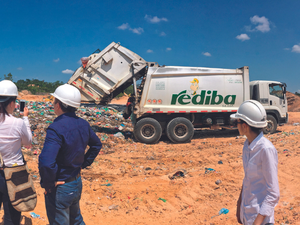
Workers with the Local Environmental Authority watch as Rediba-branded trucks dump waste at the Yerbabuena landfill in the San Silvestre wetlands. Jamir Mina
In 2017, a ruling from Colombia’s Constitutional Court – the highest constitutional court in Colombia responsible for the protection of fundamental human rights - found that Rediba had violated “the rights to health, a healthy environment and public health” of members of the Patio Bonito community, as well as their “right to equality and to live in dignified conditions.” This 2017 ruling from the Constitutional Court stopped short of ordering the landfill’s closure, as demanded by environmentalists and community members. Instead, it conditioned its continued operation on Rediba taking a series of actions designed to ameliorate its impact, including protecting local flora and fauna, improving leachate and pest control, and building infrastructure to guarantee access to clean water for the community.
When Veolia acquired Rediba in 2019, fulfilling this court order became its responsibility. Contacted by Global Witness, the French firm said it has taken extensive steps to both improve the operations of the landfill and to comply with the Constitutional Court’s ruling.
“Since the acquisition by Veolia Colombia in 2019, the operational situation on the landfill, covered by the 2017 court's ruling, has been normalised with no open investigation or pending matters with the environmental authorities as of today,” Veolia told Global Witness, noting that it had certified systems in place to “support compliance with service, operational, safety, and environmental quality standards.”
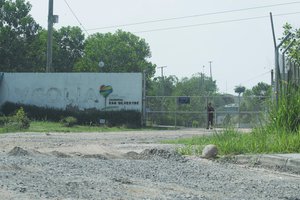
Entrance to the Veolia 'Parque Tecnológico Ambiental' (Environmental Technology Park) where the landfill is situated near Patio Bonito village, near Barrancabermeja, Colombia. Negrita Films
Field research by local organizations, however, challenges these claims. In February 2023, the NGO San Silvestre Green flew a drone over the landfill site to investigate the current situation. “We found that Veolia is committing environmental infractions and causing very serious harm to the San Silvestre protected area,” Leonardo Granados, director of San Silvestre Green, told Global Witness.
“The organic discharge from the landfill is very heavy and is having a serious impact on this critical protected area.”
According to a report compiled by San Silvestre Green, rainwater mixed with leachates from the landfill is being improperly contained and is overflowing into surrounding water sources. They also show Veolia operating heavy machinery in a protective strip of thirty metres that by law must be maintained between the landfill and surrounding permanent water sources, pushing sediment from around the landfill into these bodies of water.
All this is resulting in contamination of the surrounding wetlands, Granados said.
“We can see in the images how this is affecting the local flora, where the tropical forest is in an advanced state of deterioration,” Granados said. San Silvestre Green is using this new evidence to pursue a case against Veolia in the Colombian courts, demanding the firm be fined and seeking to have the landfill’s environmental license revoked.
When approached by Global Witness with these concerns, Veolia firmly rejected any suggestion that it was discharging leachates from the landfill into surrounding water sources. “All leachate is treated within the plant’s premises using reverse osmosis technology, introduced by Veolia Colombia, and the water obtained is reused.”
It also denied “disregarding the environmental law,” arguing that, “on the contrary the company has reinforced and modernized the treatment process to bring the site to highest environmental standards which has received top international certifications.”
However, Veolia did not address the specific concerns and evidence of ongoing contamination gathered by San Silvestre Green when they were put to it.
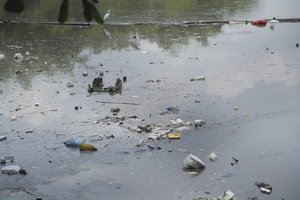
Trash contaminating the San Silvestre wetlands near Patio Bonito, a critical ecosystem harbouring extensive biodiversity. Negrita Films
Living with a landfill
The constitutional court also ordered the owner of the landfill to provide access to clean water for the Patio Bonito community (see Sentencia T-227, 4.1(iv), 12.13, 12.14, 12.29). Veolia told Global Witness that it “ensures that the communities receive drinking water from the Barrancabermeja District's via tanker trucks while exploring other feasibility of other alternatives.” This taxpayer-funder arrangement, however, was already in place before Veolia acquired the site; the facts today are that six years have now elapsed since the constitutional court’s ruling, and Veolia has operated the landfill for four of these – yet in all this time, it has taken no steps of its own to provide fresh drinking water to the community, remaining, by its own admission, at the stage of “exploring [the] feasibility” of sustainable alternatives”.
“Veolia hasn’t provided a single drop of water to the Patio Bonito residents, it is the local municipality that is doing this and which has invested more than a thousand million pesos in doing so,” Granados said.
A community member, speaking under condition of anonymity, told Global Witness: “I asked for drinking water here, not that they come and set up a landfill site on me and that was what they built us, a landfill."
An additional ongoing concern voiced by environmentalists and community members alike is the presence of pests such as rats and vultures, drawn to feast on the giant trash pile. Dealing with these “vectors” was another requirement set by the Constitutional Court. In its response to Global Witness, Veolia claimed that it has “fully complied” with this aspect of the court order, mentioning in particular “vulture management”. However, during a visit to the site, community members complained to Global Witness that the problem persists, while we were able to clearly document a large number of vultures swarming the exposed trash of the landfill during recent inspection. Again, Veolia’s claims on its management of the landfill do not seem to match reality.
"They have caused us many, many problems," a community member said, adding that the situation remains severe under Veolia.
“I can’t see any improvement at all. Everything is the same,” she said, claiming that her daughter, grandchildren and herself have suffered health impacts due to the landfill.
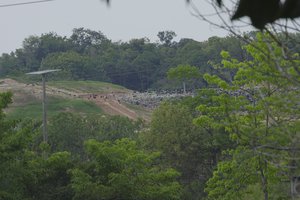
Vultures swarming exposed trash at the Yerbabuena landfill, near the community of Patio Bonito in Santander department, Colombia. Negrita Films
Defenders on the frontline exposing harmful environmental and health impacts
These questions hanging over Veolia’s operations in the San Silvestre wetlands are particularly concerning in light of the landfill’s toxic past, relating to both serious concerns raised prior to construction of the landfill and harmful impacts documented by both medical and environmental experts, who allege links to contamination from the landfill.
Prior to 2014, the site currently occupied by the landfill formed part of the ‘jaguar corridor’, an international network of protected areas linking big cat populations in Central America with those in the Amazon. The decision to construct a landfill here raised concerns about denigration of the corridor. Esteban Payán, regional director of big cat charity Panthera and member of the international IUCN Cat Specialist Group responsible for the global monitoring and conservation of jaguars and other wild cats, called the decision “absurd”.
Ostensibly, Colombian law prohibits the construction of landfills in protected areas. In 2014, however, despite concerns raised by the community and several experts, the local environmental authority, following a plan mapped out by the oil giant Oxy, authorised a portion of the middle of San Silvestre to be removed from the protected area to allow for the construction of the landfill.
The landfill began operations in 2015, taking the trash from the nearby city of Barrancabermeja, as well as domestic waste from a nearby oil refinery. Since then, environmentalists and medical professionals have documented extremely negative impacts for nature and the Patio Bonito community alike, driven by Rediba’s mismanagement of the site.
Environmentalists documented the landfill’s broader destruction of San Silvestre’s fragile ecosystems. “Whole series of fauna have fallen victim, we’ve seen mass deaths of fish, tortoises, manatees,” Oscar Sampayo, a human rights defender in environmental issues with the NGO Corporacion Yariguies-GEAM, told Global Witness. “This is an exuberant natural world which is under attack.”
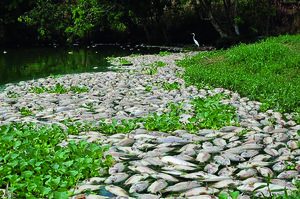
Thousands of fish have died in the nearby Moncholo stream due to contamination of the water. Jamir Mina
Even more shocking were health impacts for Patio Bonito community members, who have complained of a wave of ailments from asthma to birth defects. The most serious concerns were raised by a paediatrician, Doctor Yesid Blanco, who reported babies being born with no brain and dying at birth, a condition known as anencephaly. Other newborns emerged scarred with rashes and boils. In total, Doctor Blanco, together with the Colombian newspaper Semana, documented 27 cases of a rare skin condition known as Job, which usually affects one in 100,000 newborns in Barrancabermeja between 2016-18 – 500 times higher than the norm. The condition reportedly received its Biblical nickname because the devastating scarring it inflicts challenges the faith of those affected.
Doctor Blanco argued that such impacts resulted from a build-up of heavy metals in the waterways caused by landfill contamination. “We documented chromosome damage in children who had nothing to do with each other genetically: they weren’t relatives, but they suffered similar genetic mutations,” Doctor Blanco told Global Witness. “So we were obviously talking about genotoxicity.”
Doctor Blanco’s position is supported by a municipal authority study from February 2017, which analysed samples of sediment taken from bodies of water near the landfill. It found “significant values” of metals including “arsenic, barium, calcium, manganese, mercury, sodium, and iron”. Ingestion of such heavy metals is known to cause birth defects and has also been shown to damage DNA - correlating with the findings of studies on the children in Patio Bonito. Similarly, Fatima Garcia, a researcher from Nottingham Trent University has also documented contamination caused by the landfill however her work has been obstructed due to security concerns (see below).
When approached by Global Witness, Veolia sought to discredit Doctor Blanco’s concerns, arguing they are “supported exclusively by his personal media statements, with no documented factual, legal collective or individual claims or filings to Veolia Colombia or local environmental authorities.” The firm also pointed out that it invited Doctor Blanco to visit the landfill site in April 2020 but he did not. However, both these criticisms fail to take into account one relevant circumstance: that Doctor Blanco had fled Colombia on 5 September 2018, having received credible death threats just days after going public with his findings.
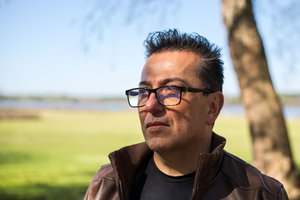
Paediatrician Yesid Blanco has documented shocking health impacts of children in and around the Patio Bonito community since the landfill began operations. He fled Colombia in 2018 after receiving death threats
In contrast to Veolia’s dismissal of Doctor Blanco’s concerns, Global Witness spoke with other expert observers who voiced astonishment that the authorities had not made a comprehensive effort to follow up on them.
“We need a real effort from the government to study the situation. We require an epidemiological study in order to have data that might be used by people to protect their territory and in particular their health,” said Professor Jesus Olivero-Verbel, Professor of Environmental Toxicology at the University of Cartagena.
“It is absolutely astonishing that this kind of research hasn’t been done.”
Nor was Doctor Blanco the only defender to receive threats after speaking out against the landfill. Just months earlier, Fatima Garcia, a researcher from Nottingham Trent University who had documented contamination caused by the landfill, also abandoned Colombia in June 2018 after being threatened.
Oscar Sampayo, the environmentalist who denounced the landfill’s impacts on the region’s biodiversity, has also fled the area after receiving threats. In 2020 – after Veolia acquired Rediba in 2019 - , both Sampayo and Doctor Blanco’s names along with other local activists were featured in a pamphlet published by a far-right paramilitary group calling themselves the Aguilas Negras, which warned that they had 24 hours to leave the territory or would be declared a military target. The previous month, Sampayo, Doctor Blanco and a Colombian Congressman had filed a protection action against Veolia, state oil firm Ecopetrol and municipal water company Aguas de Barrancabermeja, demanding suspension of the landfill operation and protection of the San Silvestre wetlands. The action, however, was declared inadmissible – and weeks later, the names of all three plaintiffs appeared in the Aguilas Negras’ pamphlet.
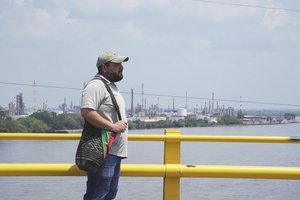
Óscar Sampayo, Environmental Defender, stands on a bridge at the San Silvestre wetlands, near Barrancabermeja, Colombia. Óscar had to leave Barrancabermeja after facing threats when he spoke out against pollution from big industry. Negrita Films
Threats such as these are part of a broader crisis of paramilitary violence which continues to haunt Magdalena Medio, the Colombian region in which Patio Bonito is located. This insecurity is linked to Colombia’s long history of political conflict, as well as its massive cocaine industry, which together have created and financed powerful paramilitary groups. There is no suggestion that Veolia plays any part in sustaining paramilitary violence in Colombia.
“Barrancabermeja is a small city where all the principal armed actors in Colombia have operated at the same time,” Fatima Garcia, the researcher who fled Colombia in 2017, told Global Witness. “Its oil industry is a cause of widespread contamination that is literally making people ill. At the same time, this is happening in a very violent context, so when someone complains or demands some level of accountability, it is common practice to use persecution and coercion to stop that from happening.”
Local press reports flag waste management as a particular focal point for paramilitary activity in Magdalena Medio. Indeed, Rediba itself has been directly linked to the region’s paramilitary groups. Its owner, Reynaldo Bohórquez, was named by the former political head of the powerful paramilitary outfit the Central Bolivar Block as someone who had sought to work with his organisation “as partners in the sanitation business.”
A community member spoke on the condition of anonymity with Global Witness stating: “Of course there are people who are scared to speak. Of course, because they don’t know the kind of people that manage all of this. There were a lot of people, many people were threatened and then because of that you hold off on speaking a little bit because you never know when they’re going to decide to send someone to get rid of you so you don’t mess with them as much.” The community member spoke about the community sharing their medical records with the doctor and when asked about how they felt about Doctor Blanco fleeing Colombia, said: “That poor man… he had everything set up in Barranca, his life was there, and well he had to abandon everything to go to a country that isn’t his own … I wouldn’t want to have to leave my country and go to another one. That is for sure, never, I would never want that or to be forcibly displaced from where I am living.”
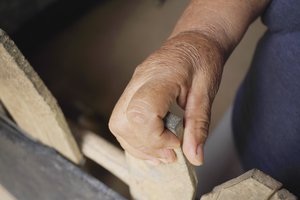
Close up of a Patio Bonito community member's hand. Community members requested anonymity when speaking with Global Witness for fear of reprisals. Negrita Films
Nothing in the response to our inquiries or due diligence materials that Veolia shared with Global Witness suggested it had sought to meaningfully understand or ameliorate the risks faced by defenders before or since acquiring Rediba - casting doubt on the company’s claim to Global Witness that it “conducts its operations with respect for human rights.” Its response, confirmed with local activists, suggests that Veolia has not worked to improve the dangerous situation faced by defenders in an area known to pose a high risk for human rights defenders – this is worrying given the heightened risk faced by defenders linked with the waste management sector in Colombia as outlined above.
Indeed, the ‘UN Guidance on ensuring respect for human rights defenders’ clearly calls for corporate responsibility for “engaging constructively with human rights defenders who raise concerns about adverse impacts to people or the environment, and preventing, mitigating and remedying the human rights risks posed to them.” It urges corporate actors to recognize the “manifold risks” faced by human rights defenders and calls for action working alongside government authorities and other stakeholders to create “a safer and more enabling environment for human rights defenders”. This should include adopting and implementing a strong policy to protect the rights of human rights defenders and support a zero tolerance policy for attacks against defenders.
Global Witness urges Veolia to implement urgent actions to engage with and address further the harms suffered by the community and defenders who have spoken out against the landfill, including fully remedying harms that have already occurred, comprehensively investigating any ongoing concerns of the community and local civil society organisations and adopting and implementing a strong policy supporting zero tolerance on attacks against human rights defenders.
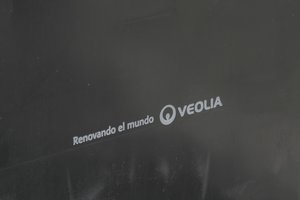
Veolia slogan "renewing the world" printed on water tanks, near Barrancabermeja, Colombia. Negrita Films
Corporate Due Diligence: A New Hope
A new law currently being negotiated in the European Union (EU) could help prevent devastating impacts in communities such as Patio Bonito, for defenders like Doctor Yesid Blanco, and others like them around the globe. New requirements for large companies under the Corporate Sustainability Due Diligence Directive (CSDDD) aims to prevent human rights abuses and harm to the environment. The law would also allow affected communities to hold large companies accountable for their business activities, giving communities a new tool to ensure European companies respect human rights and the environment – wherever in the world they are operating.
The CSDDD would require large companies doing business in the EU, to undertake human rights and environmental due diligence - a continuous process of assessing the potential and actual negative impacts of their activities and taking steps to identify, prevent and mitigate harms caused to people and the environment. It could also make it easier for communities to get access to justice through European courts, which could order compensation, injunctive relief and other legal remedies.
Safe and meaningful engagement with all stakeholders, including human rights and environmental defenders, is crucial in every step of the due diligence process. The case of Patio Bonito clearly shows that engagement must not be a tick box exercise. It is only effective when the rights and safety of affected communities and defenders, the often hostile and threatening environment defenders operate in as well as the vulnerabilities resulting from their engagement are appropriately accounted for. Meaningful stakeholder engagement is vital for identifying adverse impacts and improving the adequacy of prevention, mitigation and remediation measures.
EU lawmakers must thus ensure that the new law contains strong provisions protecting human rights and the environment throughout companies’ value chains. The devastating impact this landfill has had on the community of Patio Bonito shows the extent and impact companies’ operations can have on people and the environment. The CSDDD will help address this imbalance of power between companies and communities with the aim of forestalling horror stories like those unfolding in Patio Bonito.
- Download the full report: Scarred For Life (424.1 KB), pdf

